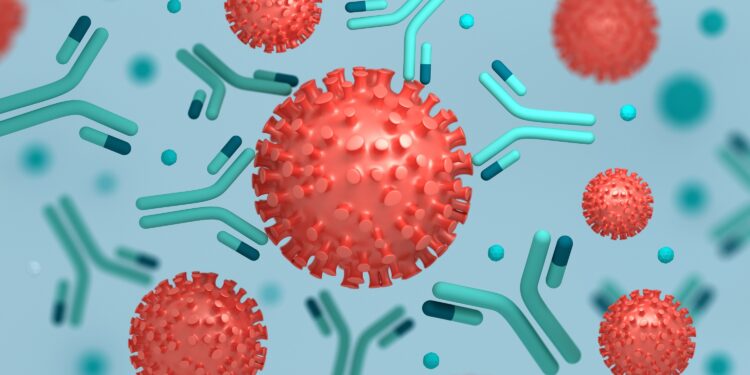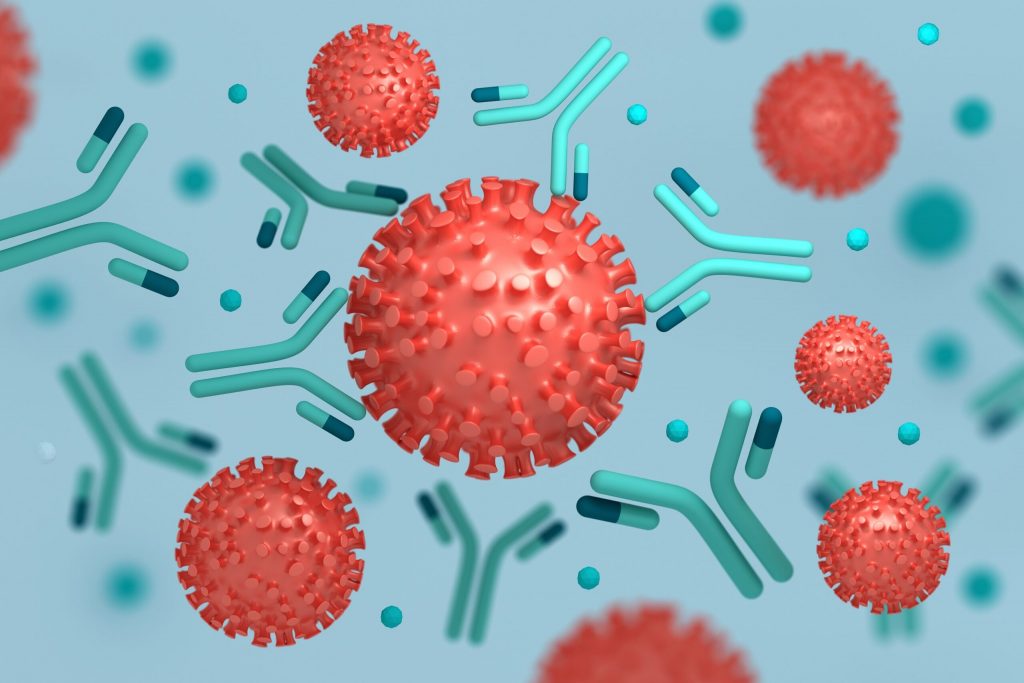
Corona: Antibodies decrease after illness
Millions of people around the world have already contracted the SARS-CoV-2 virus and survived the infection or disease COVID-19 caused by the virus. Many of them hope that this will make them immune to the pathogen. Now there is new knowledge about neutralizing antibody resistance.
When infected with SARS-CoV-2, the body produces antibodies that can fight the pathogen. Previous studies indicated that after infection with COVID-19, the protection is similar to that of vaccination, but according to new scientific studies, the antibodies diminish.
Basis for planned follow-up examinations
According to experts, the question remains open to what extent there is protection against a new infection after overcoming SARS-CoV-2 infection. The “Rhineland Study”, a population study conducted by the German Center for Neurodegenerative Diseases eV (DZNE) in the Bonn region, is presenting new results.
to me Message Blood samples from last year show that a critical component of immunity – the concentration of neutralizing antibodies against the coronavirus – decreased after four to five months in most study participants with a previous infection.
In some people who have recovered, the level of antibodies has fallen below the detection limit. This is in the specialized magazine.Nature Communications“ The published results are the basis for the planned follow-up tests.
The course is mostly mild or asymptomatic
As part of the Rhineland study – the ongoing DZNE study examining the health of the population – nearly 5,300 adults in Bonn were screened for antibodies against the SARS-CoV-2 coronavirus between April and June 2020. For this purpose, blood samples were taken from the participants and analyzed.
If the initial result is positive, these samples also undergo what is called a “plaque reduction neutralization test” in what is called an immunoassay to ensure that the detected antibodies are specifically directed against SARS-CoV-2 – not against other coronaviruses that can cause The common cold, for example.
The research team on the Rhineland study collaborated with the Institute of Virology at Charité – Universitätsmedizin Berlin to conduct these analyzes.
As indicated in the letter, antibodies are proteins produced by the immune system that the human being uses to defend itself against pathogens. According to the information, a “neutralizing” and thus a particularly effective antibody that directly blocks the penetration of SARS-CoV-2 into cells could be detected in 22 study participants – indicating previous contact with the virus.
The majority of these people reported a mild or even asymptomatic course of the disease. They tested again in September 2020 – about four to five months after their first blood sample.
It was found: in most of them the level of antibodies decreased. Not even any antibodies could be detected in four people.
Only a portion has specific antibodies
“These investigations took place during the first wave of the pandemic. So the number of people who were actually infected at this time was relatively small. Meanwhile, we have a different situation,” says the Rhineland study lead, Professor Monique Brittler.
“Our results nevertheless allow the conclusion that the widespread one-step procedure for detecting SARS-CoV-2 antibodies by immunoassay is insufficient to reliably detect residual infection,” the expert says.
“In our sample, about a third of people who were immunoassay positive already had specific antibodies against SARS-CoV-2. This should be taken into account in immunology studies. In my view, a multi-stage test like the one we used is highly recommended.” .
Little is known about the duration of immunity
However, it cannot be directly inferred from these study data to what extent the disappearance of antibodies affects the immune response, explains Dr. Ahmed Aziz, DZNE Scientist and Senior Author of the current publication.
The decline in antibodies appears to be proceeding relatively quickly. However, the immune system has other tools to fight pathogens. Antibodies are important, but they are only part of a larger arsenal. Other studies indicate that another component, we call the cellular immune response, may persist despite low antibody levels.
In fact, little is known about the duration of immunity to SARS-CoV-2 after infection. This may also depend on the particular virus variant.
“From the Rhineland study side, we want to follow the evolution of the epidemic and record its effects on the mental and physical health of the population. Our investigation is the basis for that.” Ultimately, we want to help better understand why some people have not noticed infection and others are seriously ill. . “
To do this, the researchers draw on data from the Rhineland study. Comprehensive data on health and lifestyle are recorded from all participants, such as blood counts, body composition, cardiovascular function as well as sleep, diet and physical activity.
“We have basic health-related information about all of the study participants. This could be key to understanding the effects of SARS-CoV-2 infection and for identifying risk factors,” explains Bretler. (ad)
Author and source information
This text complies with the requirements of the specialized medical literature, medical guidelines, and current studies and has been examined by medical professionals.
Inflated:
- German Center for Neurodegenerative Diseases eV (DZNE): SARS-CoV-2: New Findings on Neutralizing Antibody Resistance, (Accessed April 14, 2021), German Center for Neurodegenerative Diseases eV (DZNE)
- N. Ahmed Aziz et al .: Seroprevalence and equivalent SARS-CoV-2 antibody linkages from a population study in Bonn, Germany; In: Nature Communications, (veröffentlicht: 04/09/2021), Nature Communications
important note:
This article is for general guidance only and is not intended to be used for self-diagnosis or self-medication. He cannot replace a visit to the doctor.

“Total coffee aficionado. Travel buff. Music ninja. Bacon nerd. Beeraholic.”








More Stories
Coral Seeding: Artificial Insemination Makes Coral More Heat Tolerant
Fear, Anger, and Denial: How People Respond to Climate Change – Research
LKH Graz: Using radiation to combat heart arrhythmias